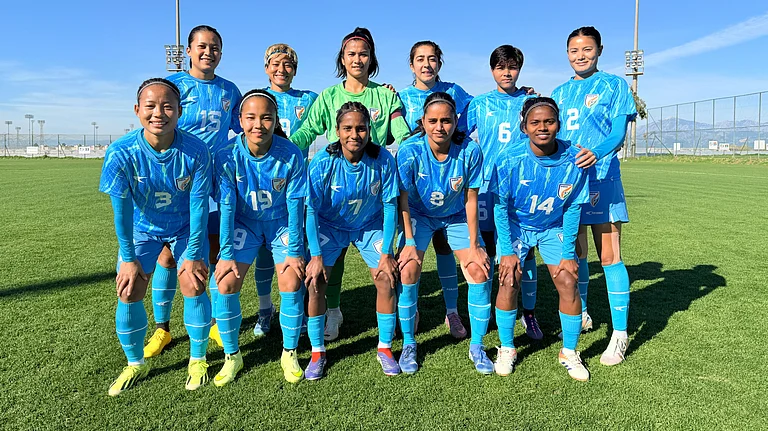On that bloody night of May 3, 2023, Manipur witnessed an upheaval that altered the lives of thousands. Fleeing their homes with scant possessions, approximately 70,000 people found themselves internally displaced. They hoped, legitimately, that the storm would pass. They hoped they would return. But in all earnestness, Manipur had never seen such a grave situation despite having earned the distinction of being the ‘most disturbed state’ back in the 1980s when it was in the thick of secessionist movements. Last September, once again, Manipur earned the ‘disturbed area’ tag “in light of the prevailing law and order situation”.
The situation had never been so grave. Nine long months have gone by. The displaced are still in camps and displaced in their own country.
The past nine months have been marked by different kinds of incidents. Heavy firing has been taking place between the Kuki-Zo and the majority Meiti community. Wherever a clear geographic divide exists, buffer zones have been built over time. The unsettling silence between clashes raises suspicions of an impending storm rather than the calm that should follow.
Amidst this turmoil, voices that are coming out, particularly from Imphal, are either snubbed or muddled. Two journalists have lately been arrested, both of whom are natives of Imphal and run vernacular papers. Dhanabir Maibam, the editor of ‘Hueiyen Lanpao’, was arrested on January 5 and was released after three days. Wangkhemcha Shyamjai, editor-in-chief of ‘Kangleipakki Meira’, was arrested on December 29 and was released two days later. Their crime was to have allegedly “published sensitive details in a report”. Two more prominent voices, human rights advocate Babloo Loitongbam and former police officer Thounaojam Brinda, faced intimidation, mob judgment, and house ransacking, raising concerns about freedom of expression.
In December, musician Akhu Chingangbam, known for his Native Tongue Called Peace project, which teaches songs from various tribal languages to Manipuri children, was allegedly kidnapped and later released.
“He later clarified that he has not been kidnapped and is safely at home. Whether he is saying this under pressure or stating the truth is not known. Things are uncertain and out of control these days, so you can’t say anything for sure,” said an Imphal-based editor without wanting to be named and, this, very much sums up what’s happening amid the unending strife.
What has gone wrong? Why is Manipur not on the nation’s mind? Why are the central and state governments so impervious (or so it would seem) to the suffering of the people of this strategically important border state? Last August, soon after a viral video of Kuki-Zo girls being paraded naked caught the nation’s attention, the Supreme Court spelled out loud and clear the “absolute breakdown of constitutional machinery” in Manipur. That pronouncement should have had an impact on how a nation responds if one of its states is found to be lacking. That renewed attention and focus on Manipur was brought back solely because of the video that went viral. Nothing happened. Even media reports have become infrequent now.
The humanitarian cry of those in relief camps isn’t enough to shake the collective conscience. For those seeking refuge on that ominous night, the aspiration for swift normalcy and a return to their lives has been shattered. According to media reports, as of September 1, there were over 58,000 people across 351 relief camps in Manipur, including more than 22,000 children and 300 people over 80 years of age. The shortage of essential commodities and nutrition and the health of children are issues in the camps. Their collective elusive dream of returning home intensifies the palpable disappointment felt by the people of Manipur.
The prevailing sentiment suggests that there exists apathy and disinterest regarding the plight of Manipur. The lack of immediate intervention and a clear plan for resolution deepens frustration and disillusionment among the displaced population in particular and the people in general.
As it seems, peace commissions set up so far have not yielded any visible result. The silence emanating from authority speaks volumes in Manipur. It’s indicative of a dismissive attitude, downplaying the severity of the situation and a reluctance to acknowledge the deep-rooted issues contributing to the crisis. The assertion that a one-size-fits-all policy is unsuitable for Manipur in particular and the Northeast in general becomes even more relevant here. The state’s unique socio-cultural landscape and its strategic geographical location must be heeded. Its pluralistic nature of society, both ethnically and historically, demands a nuanced, region-specific strategy to address its multifaceted challenges.
There is a need here for a detailed study and listening of the grievances of both communities and that has not happened in the true sense of the term. For instance, there is a need to delve deep into the grouse of the hills tribes who are “older than the mountains where they forage and co-exist along with nature”. They nurse many historical grievances of institutionalised neglect; profound disproportionate distribution of resources; all infrastructures centred only around the valley which is anyway the seat of power, and then the eviction drives in places like K Songjang village in Churachandpur district in February 2023, which was carried out with such insensitivity to the point that Kuki Zo communities believed this had a deep sinister design.
Now, the divide has widened to the point that Kuki Zo communities are seeking a separate administration. The Meiteis are opposing this demand tooth and nail while calling the Kuki Zo communities illegal migrants who have no right over the land. The situation has reached a state where it is assumed that it is only ‘finish to the last’ sort of fight which is the answer. Far from it, this will only cripple both the communities. While the unrest inside its neighbouring Myanmar could have its spillover impact on Manipur which shares a porous 390-km border, it certainly could not have been the sole cause of the conflict. While self-denial and scapegoating do rounds, the grave situation now necessitates a mediator to find a middle path that is fair and just to the people of Manipur.
The hill communities have lost access to Imphal airport in Manipur. They now have to endure the challenging 12-hour drive through Mizoram’s rugged mountain roads. This is a significant concern for the community at large as medical emergencies become a challenge. This situation not only poses logistical challenges but also has broader implications for the affected community in terms of accessibility, connectivity, and overall well-being. The extended travel time and the need to pass through Mizoram for those residing in the hills can disrupt essential services, economic activities, and personal travel.
Landlocked Imphal is caught in an odd situation nonetheless. There has been an economic downturn and small business owners and businesses across various sectors are grappling with losses.
The inaction from concerned authorities carries significant political ramifications, particularly with elections looming. The perceived neglect of the Manipur crisis raises questions about the government’s priorities. Allowing the wound to fester with no clarity on where it is heading is unimaginable. Manipur deserves a government that actively works towards resolution, acknowledging the suffering of its people. The inability to control the violence in Manipur despite the presence of centralised forces to the tune of over 70,000, in addition to the presence of already adequate forces from the Indian Army and CRPF, reflects not only on the strength of the Indian government but also on India’s global standing.
As the world’s largest democracy aspiring and vying for a visible global leadership, the incapacity to manage a state smaller than several others raises concern about India’s ability to handle internal conflicts. It also, ironically, justifies the age-old grievances of the people of the Northeast that they have been treated with a lack of empathy and sensitivity even after 76 years of Independence. This grievance has never been closer to the truth than now.
(Hoihnu Hauzel is an independent journalist and founder of www.thenestories.com and www.northeastodyssey.com. Views expressed are personal.)


















